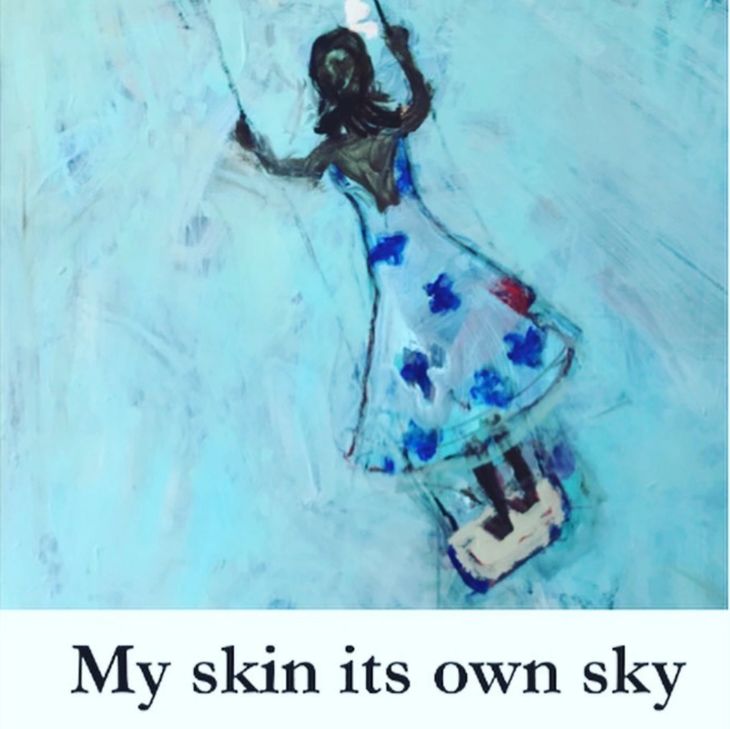 Reviewed by Magdalena Ball
Reviewed by Magdalena Ball
My Skin its Own Sky
by Gillian Swain
ASM & Cerberus / Flying Island Books
Australian pocket poets series
68 pages, ISBN:9789996557422, Dec 2019
Those of us who have heard Gillian Swain reading her work at various slam events, open readings, and literary festivals over the years will no doubt rejoice that there’s now a new book of her work following on from her 2001 debut Sang Up. Gillian’s poems are so warm; so rich and lovely, that being able to read and re-read is a joy. The poetry in My skin its own sky reminds me of the work of Bernadette Mayer: the deep engagement with the present, and a self-reflexiveness that is enlivened by the details of distraction – looking after children, working and earning a living, or coping with the death of a dear friend or a child’s friend. The poems cover a familiar terrain and recognisable spaces but the observation is so intensely close that it becomes abstracted into something both grand and collective. Gillian’s choice of words and her arrangements are mindful and unhurried, no matter the subject. The work has an overarching sense of nostalgia, past and present working in sync as with “The Front Step”:
This place grew me.
Day hot the lake smiles
back at sky and I
am on the step. The shrubs shoulder inaround the shape of memory
The work is intimate, sensual, and full of the details of places, spaces and people who are only able to be created through language and memory:
Night brings the orb spiders out.
He sits on the top step for hours
watches them weave,
teaches me to love themand their rhythmic window making.
Glimpse stars through silk frames
night looms move and sweep
hypnotic lullaby of
an old man’s love for the spiders. (“Tongue Clicks”)
The settings are local: Newcastle Baths, Cooks Hill, Warners Bay. Early on in the book, there is a line “This place grew me”, and it is out of place that many of these poems are grown or perhaps spun. The stars glimpsed through the spider’s silk frame becomes magic, a portal out of DNA which links generations:
I am a walking prayer
an alchemist carrying wateryou bring me fire song
earth song
moon. (“32 Weeks”)
There is a slow sensuousness to this work, a motion – waves come in and go out, a child feeds, swims, grows, day becomes night, and always there is walking, smelling, feeling, listening and observing:
Fruit laden treetops wait heavily for harvest
sweet flesh stripped from palm nuts
figs chewed up spat out
feasting bats chatter and chortle
in rich deep indulgence
of night. (“Shoeless in Cook’s Hill”)
The poems develop around everyday life and are rooted in the body at work: caring for children, doing housework, cleaning, hanging washing on the line, gardening, watching fireworks on television at New Years. Gillian takes those subjects and turns them into poetry, reminding us that creative process happens everywhere. Life itself is the creative force:
Upended other-placely,
this is the dialogue
of nine-year-olds and water. (“Other-placely”)
With such a close gaze, the mundane is elevated to mythological – a cleaner to Hera, a woman to tree (“Read my leaves bark splintering falls to ground like knees”), or a shape-shifting goddess. The divine is always lurking below the surface, glittering just beneath the chores or even as the chores. These are poems that are rooted in the natural world – Jacaranda and bees, lotus flower, straw-grass and paddocks, flowers, sunlight, cicada, flying fox, rock, wood, creek:
Harmonics slip through narrow spaces
our hosts move bodily to us,
fossils laid among our voices
the notes are forests
of unread chronicles. (“Beyond the giant bracken”)
Throughout these poems, we are encouraged to pay attention to what is here, now – the magic in the everyday. As a spoken word artist, Gillian understands the power of breath, and in this collection manages to incorporate breath into the work through rhythm, spaces, pause, a judicious use of the line break, of gaps, and silence:
All the whispers stay,
you only have to listen
night is never empty.
Lean into it,
there’s always morning. (“Tin Fence”)
Many of the poems in the second half of the book pivot around grief and loss. Collectively, the poems arc like a narrative, moving from ambulance to hospital vigil to death to packing up a house in the aftermath in what is both an intensely moving and personal journey and also a way of exploring and sharing a pain that is universal. Gillian does this beautifully, in her distinctive style of mindful observation, sweeping a poetic eye over the scene and letting silence do its work:
Mouthwash straw water ice
apple cheese crackers
too many cups.Couch sick-bag pillows
pump cannula oxygen (“Too many cups”)
Though this part of the book is sad and moving, it is also charged with tenderness and even joy:
You saw me quaking,
bony fight-weary fingers
squeeze my soul,
your voice slips through the lightDon’t cry my darling
I am so lucky
I am so lucky. (“After the earthquake”)
My skin its own sky is an intensely honest book, one that doesn’t shirk at going into dark places or sharing what is unbearable. But always, and throughout this gorgeous collection, in every poem, there is a moment of transformation, where pain becomes beauty. This is the power of the work—by looking and exploring these domestic, broken, and charged moments with the clarity of a poetic gaze, Gillian Swain gives them back to us whole. My skin its own sky is a beautiful and powerful collection by a poet that anyone who is a local will already know and love. I commend it to you, and am honoured to officially declare it launched.